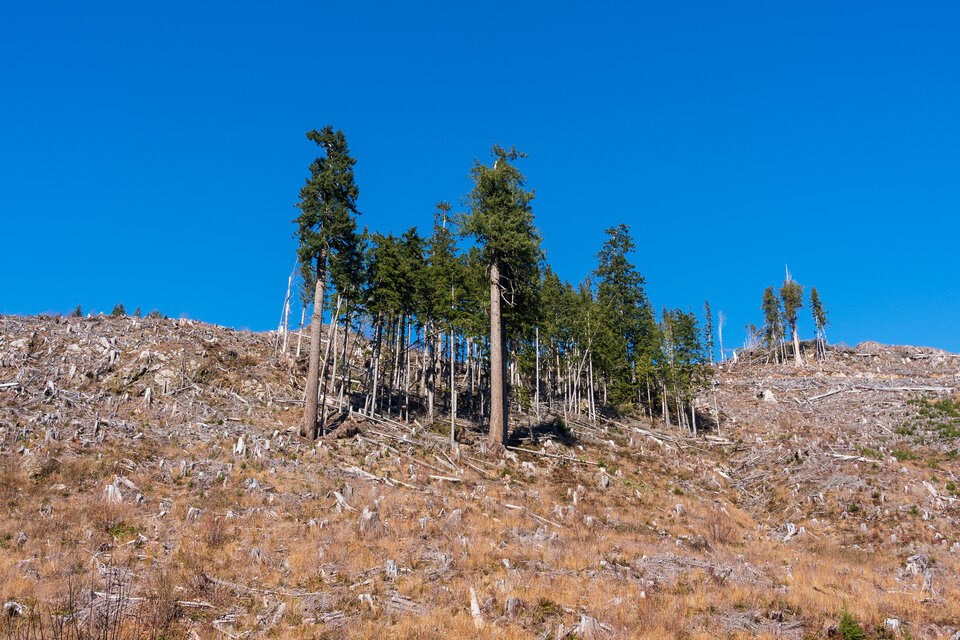More than a hundred scientists have signed a letter to Canadian Prime Minister Justin Trudeau calling on his government to define “forest degradation” based on damage done to ecosystems — not what it costs the economy.
The letter, written by Dominick DellaSala, chief scientist for the California-based conservation group Wild Heritage, calls on the government to back global efforts to expand the protection of the rarest and most carbon-rich forests, such as those in Canada's boreal and western temperate rainforests.
“Primary forests and old-growth forests have special values which, once lost, are irreplaceable on any meaningful human timescale,” writes DellaSala.
Degradation is widely acknowledged to cover areas where human activity has caused damage to a forest’s native species, structure and function, and its ability to clean water and store carbon. Unlike deforestation, however, degradation means the land hasn’t been converted into some other use.
Most of the signatories to the letter come from Canada and the U.S. They include influential author and University of British Columbia forestry professor Suzanne Simard and Karen Price, an old-growth ecologist at the Bulkley Valley Research Centre who served as a technical advisor on –°¿∂ ”∆µ’s Old Growth Strategic Review.
“What it's asking for is for Ottawa to listen to the science,” said Price. “Let's focus on the climate crisis and a biodiversity crisis that essentially is threatening the survival of humanity.”
“I'm not blaming industrial forestry, obviously, for all our climate [and] biodiversity crises, but for sure, it's been a contributing factor.”
Canada moving to create domestic definition of 'forest degradation'
The letter comes as Canada’s government leads an effort to create a some worry might be used to circumvent new European Union regulations meant to limit the import of forestry products linked to the practice.
Price said she signed the letter because she was distressed the federal government’s move to change the definition of forest degradation would make it “meaningless.”
“A primary forest, it's not just like a bunch of trees. It's a collection of organisms, trees and plants and mushrooms and microbes and animals who live together long enough that they have created an interconnected community that communicates and shares resources,” said Price.
“You can't just build that up by planting trees... A managed plantation, it's nothing like a natural forest ecosystem. So to say that we are managing sustainably is simply a lie.”
The letter notes that Canada and 144 other nations signed the Glasgow Leaders’ Declaration on Forests and Land Use, which in November 2021 committed to halt and reverse deforestation and land degradation by 2030.
Given that commitment, industrial logging, and the road building that comes with it, should “consistently and incontrovertibly” count as forest degradation, the letter says, especially in old-growth forests that hold “unique values for climate mitigation, biodiversity conservation, water quality, and other ecosystem services.”
They write that identifying degradation should include both industrial impacts in primary and old-growth forests, and the “conversion of naturally regenerating forest to planted forests or plantations.” The letter says the term “sustainable forest management” should be rejected and shouldn’t influence whether a forestry activity counts as degradation.
Natural Resources Canada, which is coordinating the creation of a domestic definition for “forest degradation,” was not immediately available to comment.
Degraded forests more flammable
The impacts of forest degradation will inevitably contribute to devastating wildfires, according to the scientists.
The letter says “logged forests are susceptible to more frequent, intensive wildfires than primary and old-growth forests” because they are more fragmented, filled with logging slash, and often have an artificially dense number of young trees. Meanwhile, monoculture tree planting, fire suppression “and other common industry practices further exacerbate wildfire conditions.”
Under a rapidly changing climate, “degradation may have compounding effects that hinder forest regeneration altogether, resulting in permanent forest cover loss,” the letter states.
“Their definition of sustainable forest management is based on a very simple view that you replace a tree with a tree and, and it ignores the fact that our industrial forestry doesn't sustain carbon, doesn't sustain biodiversity, doesn't sustain a whole host of other values,” Price said.
The 2023 fire season in Canada was the most destructive in the country’s recorded history, burning nearly 180,000 square kilometres of forest — more than half the size of Vancouver Island. By August, those fires had already released more than a into the atmosphere, double that put out by Canada’s entire economy in 2021.
–°¿∂ ”∆µ’s old-growth coastal and interior temperate rainforests have been known to store 1,000 tonnes of carbon per hectare, but they also offer a major bulwark against such fire, said Price.
“We still have forests on the west coast of –°¿∂ ”∆µ that haven’t burned since [the last] glaciation. So we're at thousands of years of continuity,” she said.
“We may see increased burning even on the coast, but they are the least likely forests to burn across Canada.”




